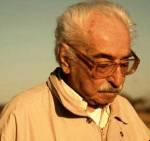Editor’s Note: These texts can be read in English and Portuguese. Clicking “Español” will take you to the texts in Portuguese.
I.
I wanted to write with bird words.
We lived in an immensely and nameless place
where we played with word play
like: Today I saw an ant kneeling on a rock!
Mother overhearing us play said:
There you go with your visions again!
Ants don’t have kneeling knees
and there are no sacristy rocks around here.
What a prank of the imagination.
The boy had a stony silence in his gaze
and in his voice a clarity of Springs.
Father thought we wanted to unsee the world
To go find new things to see in words
like: I saw the morning perched over the river
banks like an open crane on the loneliness of a rock.
Such novelties the boys made with their words.
Then Bernardo came with another one: Today I saw
a frog with a tree gaze.
So it was clear we needed to unsee the world to leave
that immensely and sideless place.
We wanted to find images of birds blessed with innocence.
In that place we learned nothing but ignorance
so as to fully understand the voice of the waters
and the snails.
We liked words best when they disturbed
the common stream of ideas.
We already knew that only the absurd
makes poetry.
IV.
A most beautiful place for a bird to land is the word.
In my words we all still lived as country boys,
a fool and me.
I lived tangled in my verbal rubble.
The boy walked enclosed in birds.
And a tree went on being Bernardo.
Back there even saints sprouted from stones.
Because we were all sheltered by words.
We all used a spring language.
I travelled with the words like a dictionary.
We wish we heard the silence of dew
over the stones.
You also wish you knew what the birds
know about the winds.
We liked to only use bird words
because they were blessed with innocence.
Bernardo said he’d heard a wind almost leaning
on the afternoon’s clothes.
I dreamed of writing a book with the same
innocence of children making their ships
of paper.
I wanted to touch the morning’s body with my hands.
I thought vision was a poetic act
of seeing.
You didn’t like the common path of words.
Better if I liked the absurd.
And what if I were a snail, a tree, a stone?
And what if I were?
I didn’t want to fill my time using
words bitten by overuse.
What I wanted was to unsee the world. Like: I saw
a vulture evacuating on the morning’s clothes.
Wouldn’t that send away boredom?
And how could I’d known that silence dreamed
of being stone!
V.
The place where we lived had mostly animals
loneliness and trees.
My grandfather dated loneliness.
He was an anthology of abandonment.
Everything I have left of that grandfather is this
image: him lying on the hammock with his girlfriend, and
if for some reason we got him out of the hammock,
loneliness was uncovered.
Oh, the exposed loneliness!
That image of loneliness stayed with me for years.
Ah, my father. Father herded cattle and more cattle.
He had a pretentious bird gaze.
And taught freedom.
We went wandering through the brimless bushes
until we came to the edge of a river.
The morning was perched on the riverside, open as
a bird.
By then already the hill touched the sun.
Up ahead we saw a coati licking an emu bone.
The afternoon grew in through the woods.
The place had lost us.
We felt like the legs of an ant
lost on the road.
Bernardo completed the abandonment.
Then we found a calf of snails on the river
sand.
Nearly all snails were widowed from their slugs.
They say the clever vultures descended onto that place
to savor the slugs, still alive.
They say this quiet place would have been part of the
Xaraiés Sea.
At the edge of the night we were aimless.
Bernardo showed up and said the wind is a horse.
So we rode on the wind’s rump and soon arrived
home.
Mother was distressed.
She took care of everyone: she washed, ironed, and cooked
for everyone.
And at night still found some time
for her violin.
She played Vivaldi for us
while we were hanging in tears.
One day or other I told Mother that I’d seen
a bird chewing on a piece of wind. Mother
said again: There you go with your visions! What
a prank of the imagination.
It’s the voice of God that lives in children, in birds
in fools.
The infancy of the word.
18.
Bernardo set up his tent in the banks
of a frog.
He was a frog expert.
Nature portrays him.
Bernardo is a creator.
He saw a bird sitting on the shoulder of the red sky.
A lizard leaned on him to sleep.
25.
I present the tale of a fool.
One that nature would evolve
into a tree.
One who wandered like a bird, as
stones wander in dew.
One who knew the flowers
like the bees do.
That’s right!
A fool who wanted to grasp a frog’s language
To write oneself in frog.
From Menino do mato [Country boy]. Editora Alfaguara, Rio de Janeiro, 2015.
Translated by Bruna Dantas Lobato and Flávia Stefani


